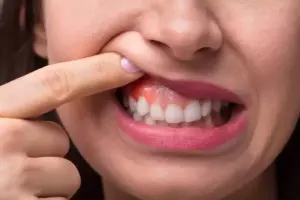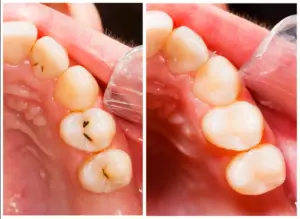Tooth sensitivity is a common dental concern that affects many individuals, impacting their ability to enjoy everyday activities such as eating and drinking. This condition can range from mild discomfort to severe pain and is often triggered by certain foods and beverages. Exploring the connection between tooth sensitivity and food can help individuals make informed choices and find relief from discomfort.
What is tooth sensitivity?
Tooth sensitivity, also known as dentin hypersensitivity, occurs when the protective enamel covering the teeth is compromised, exposing the underlying dentin and connected nerve endings. As a result, the teeth become sensitive to external stimuli such as temperature, pressure, or acidity.
Common triggers for tooth sensitivity include hot and cold foods, sugary or acidic foods and drinks, and even cold air or brushing. The discomfort from tooth sensitivity can be fleeting or persistent, depending on the underlying cause.
Causes of tooth sensitivity
Understanding the factors contributing to tooth sensitivity can aid in identifying effective strategies for managing the condition. Here are some common causes:
Enamel erosion
The gradual loss of enamel due to acidic foods or drinks, aggressive brushing, or regurgitated stomach acids can lead to exposure of the dentin and tooth sensitivity.
Gum recession
Gum recession exposes the root surfaces of the teeth, which lack enamel protection, resulting in increased sensitivity.
Tooth decay
Cavities can cause sensitivity by penetrating the outer layers of the tooth, irritating the nerves.
Cracked or chipped teeth
Damage to the tooth structure can expose the sensitive inner layers, leading to discomfort.
Teeth grinding
Chronic grinding or clenching can wear down enamel, exposing the sensitive dentin underneath.
Recent dental procedures
Sensitivity may occur following dental treatments such as fillings, crowns, or teeth whitening, though this is typically temporary.

The connection between tooth sensitivity and food
Certain foods and beverages are known to exacerbate tooth sensitivity, causing discomfort and pain. Understanding the relationship between tooth sensitivity and food can help in making dietary adjustments to minimize triggers.
Foods and beverages that trigger tooth sensitivity
- Hot and cold foods: Extreme temperatures can cause pain in sensitive teeth. Foods and drinks such as ice cream, hot coffee, or soup are common triggers.
- Acidic foods: Citrus fruits, tomatoes, vinegar, and other acidic foods can erode enamel and increase sensitivity.
- Sugary foods: Sweets promote the growth of bacteria that produce acid, further wearing down enamel and exposing the dentin.
- Carbonated beverages: Sodas and sparkling drinks contain acids that can contribute to enamel erosion and increase sensitivity.
- Alcoholic beverages: Many alcoholic drinks, especially wine, are acidic and can exacerbate tooth sensitivity.
Managing tooth sensitivity through diet
Minimizing the discomfort of tooth sensitivity involves making mindful dietary choices and adopting habits that protect enamel and reduce exposure to triggers.
Dietary adjustments
- Limit acidic foods and drinks: Reduce consumption of foods and beverages that may erode enamel, such as soft drinks and citrus fruits.
- Consume with meals: Eat trigger foods as part of a meal to help neutralize acids with the help of other foods and increase saliva production.
- Rinse with water: After consuming acidic or sugary foods, rinse your mouth with water to help wash away harmful substances.
- Opt for dairy products: Foods like cheese, milk, and yogurt can help neutralize acids and provide calcium to strengthen teeth.
- Incorporate fibrous foods: Foods high in fiber, like vegetables and whole grains, need more chewing and can stimulate saliva flow to protect teeth.
Best practices for oral health
- Use a soft-bristled toothbrush: Brush gently with a soft-bristled toothbrush to avoid further enamel wear or gum recession.
- Use desensitizing toothpaste: These toothpastes have compounds that help block the transmission of pain signals to the nerves.
- Fluoride treatments: Professional fluoride treatments can strengthen enamel and reduce sensitivity over time.
- Avoid overbrushing: Brushing too aggressively can wear down enamel. Use gentle circular motions for thorough but gentle cleaning.
- Address bruxism: If teeth grinding is a cause, consider wearing a night guard to protect teeth and reduce sensitivity.
Seeking professional help
While managing tooth sensitivity with dietary adjustments and good oral hygiene practices is effective, consulting with a dental professional is crucial for comprehensive care. Identifying and addressing the root cause of sensitivity with expert guidance can lead to more effective relief.
The role of professional dental care
Dental professionals can offer treatments and interventions specific to your needs, ensuring the best management of tooth sensitivity:
- Dental sealants or bonding: These protective layers can cover exposed root surfaces or enamel, reducing discomfort.
- Surgical solutions: For severe gum recession, a gum graft may be required to protect teeth against sensitivity.
- Custom mouthguards: These help manage bruxism by preventing tooth wear and reducing sensitivity.
Prioritizing oral health can prevent sensitivity
Preventing tooth sensitivity and managing its discomfort involves adopting a comprehensive strategy that includes dietary adjustments and quality dental care. By taking proactive steps, individuals can protect their teeth and enjoy a life free from sensitivity-related discomfort.
If symptoms persist, seek the expertise of leading dental professionals. For those in need of quality dental care, Dental 6&E stands out as the best option among dentists in Tijuana, offering expert guidance and personalized treatment plans.

Embrace a sensitivity-free life
Tooth sensitivity doesn’t have to limit your enjoyment of food and drink. By understanding the connection between tooth sensitivity and food, making informed dietary choices, and seeking professional dental care when needed, you can protect your smile and lead a sensitivity-free life.






